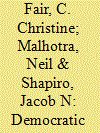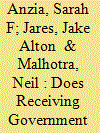|
|
|
Sort Order |
|
|
|
Items / Page
|
|
|
|
|
|
|
| Srl | Item |
| 1 |
ID:
133712


|
|
|
|
|
| Publication |
2014.
|
| Summary/Abstract |
A long-standing research tradition on political culture argues that greater support for core liberal values leads to a rejection of destructive political activities and reduced support for violent politics. In this vein, many contemporary analysts of security policy contend that a lack of democratic values in the Middle East promotes the development of violent political organizations. Unfortunately, there have been few direct tests of the hypothesis that an individual's rejection of democratic values correlates with support for militant groups. We conduct such a test in Pakistan using an original 6,000-person provincially representative survey. We find that strong supporters of democratic values are actually more supportive of militant groups and that this relationship is strongest among those who believe that Muslim rights and sovereignty are being violated in Kashmir. This is consistent with the context of Pakistani politics, where many militant groups use the principle of azadi (i.e., freedom and self-determination) to justify their actions. These results challenge the conventional wisdom about the roots of militancy and underscore the importance of understanding how local context mediates the influence of civic culture on political stability and violence.
|
|
|
|
|
|
|
|
|
|
|
|
|
|
|
|
| 2 |
ID:
165400


|
|
|
|
|
| Summary/Abstract |
Previous research has emphasized corporate lobbying as a pathway through which businesses influence government policy. This article examines a less-studied mode of influence: private regulation, defined as voluntary efforts by firms to restrain their own behavior. We argue that firms can use modest private regulations as a political strategy to preempt more stringent public regulations. To test this hypothesis, we administered experiments to three groups that demand environmental regulations: voters, activists, and government officials. Our experiments revealed how each group responded to voluntary environmental programs (VEPs) by firms. Relatively modest VEPs dissuaded all three groups from seeking more draconian government regulations, a finding with important implications for social welfare. We observed these effects most strongly when all companies within an industry joined the voluntary effort. Our study documents an understudied source of corporate power, while also exposing the limits of private regulation as a strategy for influencing government policy.
|
|
|
|
|
|
|
|
|
|
|
|
|
|
|
|
| 3 |
ID:
187669


|
|
|
|
|
| Summary/Abstract |
When individuals receive benefits from government programs, does it affect their attitudes toward those programs or toward government generally? A growing literature blends policy feedback theory and political behavior research to explore these questions, but so far it has focused almost exclusively on social policies such as the Affordable Care Act. In this article, we focus on a very different set of government programs that reach a more conservative, rural population: agricultural assistance. Our study ties administrative records on participation in USDA farm aid programs to an original, first-of-its-kind survey measuring agricultural producers’ political attitudes. We find that receiving agricultural assistance is sometimes related to producers’ views of the program delivering the benefits, but it depends on the divisiveness of the program and—for highly partisan programs—recipients’ ideology. However, receiving federal agricultural assistance is not associated with more positive views of government.
|
|
|
|
|
|
|
|
|
|
|
|
|
|
|
|
| 4 |
ID:
090820


|
|
|
|
|
| Publication |
2009.
|
| Summary/Abstract |
Do voters effectively hold elected officials accountable for policy decisions? Using data on natural disasters, government spending, and election returns, we show that voters reward the incumbent presidential party for delivering disaster relief spending, but not for investing in disaster preparedness spending. These inconsistencies distort the incentives of public officials, leading the government to underinvest in disaster preparedness, thereby causing substantial public welfare losses. We estimate that $1 spent on preparedness is worth about $15 in terms of the future damage it mitigates. By estimating both the determinants of policy decisions and the consequences of those policies, we provide more complete evidence about citizen competence and government accountability.
|
|
|
|
|
|
|
|
|
|
|
|
|
|
|
|
|
|
|
|
|